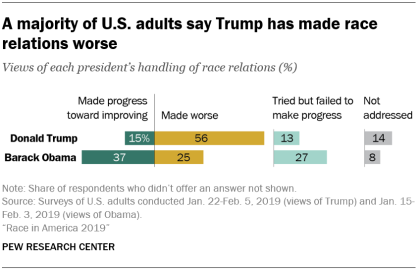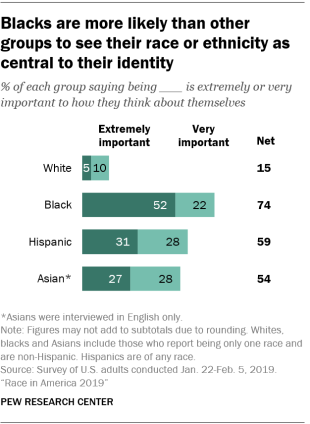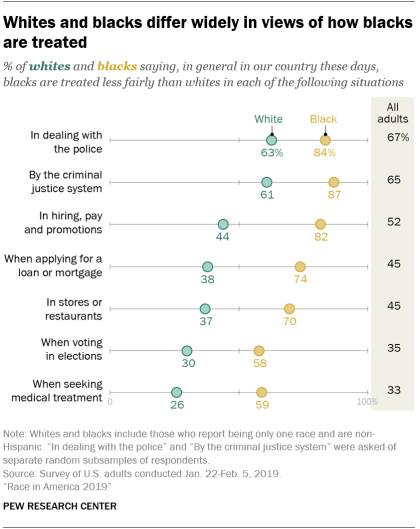|
In
light of the rise in hate crimes in America in recent years, and the
rise of President Donald Trump through the exploitation of racial
divisions and raw appeals to white supremacy, racism is on the minds
of many. A new survey from Pew Research Center shines a light on what
Americans across the racial spectrum are thinking about the state of
racial progress, and the findings are not encouraging. Moreover, most
people identify Trump as a part of the problem in an era of worsening
race relations.
The
report, called “Race
in America 2019”
(pdf),
is a survey of 6,600 people, including 3,000 white respondents, 1,500
Black and Latino participants, and 355 Asians, according to Pew.
While Black, Latino and Asian people were overrepresented in the
study, their responses were weighed in proportion to their
representation in the U.S. population. The extensive study presents
some sobering and eye-opening results on racial opinions based on
race, age, education and political affiliation.
“One
of our overall takeaways is that Americans are quite negative about
the state of relations and equality,” Anna Brown, a research
analyst with Pew Research Center told Atlanta Black Star.
One
poignant example of this reality is that half of Black people
surveyed said they would not likely have equal rights with whites, as
opposed to only 7 percent of whites who agreed Blacks never would
attain the level of rights whites enjoy.
Those
surveyed believe that Americans are more emboldened and comfortable
with expressing racist sentiments in public, and President Trump is
the reason. Trump — who has called African, Caribbean and Latin
American nations “shithole countries” and referred to
violent white supremacist and neo-Nazi protesters at the 2017 Unite
the Right rally in Charlottesville, Virginia, as “very fine
people” — has been cited for enabling white nationalists
and a climate of intolerance. Some 56 percent of Americans believe
Trump is responsible for deteriorating race relations, with 15
percent saying he has improved relations, and 13 percent believing he
attempted but did not succeed. “A majority of Americans have
said Trump has made race relations worse and whether expressing
racially insensitive views have become more common. About 65 percent
say it has become more common to express racially insensitive views,
and 45 percent say it has become more acceptable,” Brown said.

The
findings of the Pew study come down along lines of political
partisanship. For example, white Democrats were more likely than
white Republicans to believe the country’s legacy of slavery
has had an impact on the current state of African Americans. “We
found that partisanship is strongly associated with racial
attitudes,” Brown noted, adding that “partisanship had a
closer association than demographic factors. We weren’t able to
look at Black Republicans because they are a relatively small share,
so we were mostly looking at white and Black Democrats.”
The
education level of the people surveyed influenced their views on race
and how woke they are on racial justice issues. “We’ve
consistently found … among Blacks, those with at least some
college say being Black hurt their ability to get ahead,” Brown
said. “Among Blacks and Hispanics those with some college
experience are more likely to say they have ever experienced
discrimination or unfair treatment,” she added, noting that
whereas among white folks, college-educated whites said they
benefited because of their race.
Further,
age played a role in opinions on the national racial climate. “One
interesting thing with Blacks is that older Blacks have positive
views about Black-white relations, and younger whites and Blacks were
less likely than older [people] to say their race is more important
to their overall identity,” Brown said. Among Black
millennials, 64 percent say being Black is at least very important,
as opposed to three-quarters of older Black people surveyed. Few
whites responded that white identity is central in their lives, and
younger white people were most likely to say it is not important.
Foreign-born Latinos were more likely (65 percent) than U.S.-born
Latinos (52 percent) to conclude that being Hispanic is very
important in their perception of themselves. Nevertheless, Black
people are far more likely than others to say that race or ethnicity
is central to their identity.

Some
of the data in the Pew study illuminate the glaring differences in
opinion between Black and white America, even when a majority of both
groups hold the same stance on issues of racial disparities and
injustice. For example, even as most people across race believe Black
people are treated worse than their white counterparts in the
criminal justice system, 87 percent of Blacks agree but only 61
percent of whites agree. Similarly, 84 percent of Blacks and 63
percent of whites believe Black people receive unequal treatment at
the hands of law enforcement, and large Black majorities but fewer
than half of whites think Black people endure unfair treatment in
employment, voting, health care and other aspects of daily life.
By
contrast, most Americans, including comparable numbers of Blacks and
whites, believe that white people should not use the N-word under any
circumstances.

Respondents
across the spectrum of people of color reported experiencing
discrimination. For example, 76 percent of Blacks, 75 percent of
Asians and 58 percent of Latinos said they have experienced racial
discrimination, while 67 percent of whites say they have not faced
such treatment. Further, Asians were most subjected to slurs, and
whites were most often accused of being racist or prejudiced. Among
Latinos, darker skin color was associated with discriminatory
treatment, while among Blacks, being a highly educated Black man
rather than having a darker skin tone correlated more strongly with
negative experiences based on race.
As
a nonpartisan, non-advocacy organization, Pew does not provide
opinions on their studies and does not comment on the policy
implications of their findings. However, the results of their most
recent report on race in America speak for themselves, and the people
surveyed reinforce the notion that America is in a bad way on matters
of race. And they believe Trump is only dragging us down further.
This
commentary was originally published by AtlantaBlackstar.com
|

